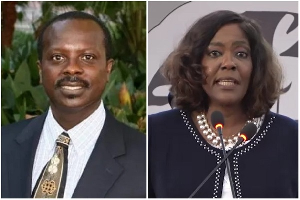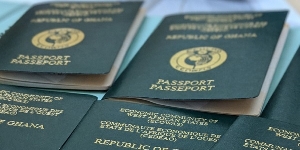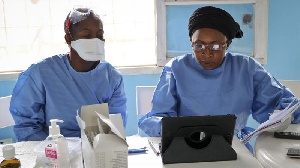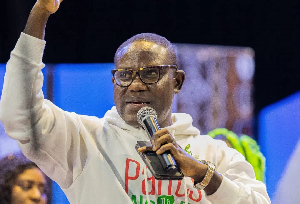By Jans Nouh Shuaib & PK Opoku Bonna
Our continent is endowed with abundant natural resources, yet we Africans have failed to develop the resources in order to get rid of poverty that has become synonymous with the word ‘Africa’. In an attempt to diagnose the problem, some Africans attribute our lack of development to colonialism, western economic-hit-men and/or dependency theory. However, those of us, who admit that these forces exist and operate, not only in Africa, prefer to look within and believed to have found the real culprit in our midsts, who are our own brothers and sisters - the ruling elites.
An ex World Bank Economist described African Governments as brigands with bigger guns, who will take anything including the incentives to produce. In other words, the ruling elites dishonestly appropriate anything that is entrusted to them including resources meant for investment to release the energies and entrepreneurial sprit of the people to create wealth. Thus, according to this economist, the availability of incentives makes the difference between countries; some countries are rich because incentives are provided, and others are poor because the incentives are siphoned by corrupt officials and are not provided. Consequently, our countries, which do not provide proper incentives for wealth creation, grow poorer and the corruption becomes more endemic and daring every now and then. As some one rightly pointed out, our continent is a bottom less sea and no amount of aid can lift us out of poverty unless we mend our ways and change from within.
Politics in Africa today, as far as most of our politicians are concerned, is a ‘gold mine’ and each of them hopes to strike it rich before the end of their term, extend the term if possible or remain in power indefinitely. For them, politics has nothing to do with service to the people or honour. Infact, it is sometimes annoying to hear people refer to some of these ‘gold diggers’ as statesmen or honourable servants. Whereas our farmers who go to the farm from dawn to dusk seven days a week, the fishermen, the labourers (walantuwalansah) constructing our roads, the miners risking their lives to bring out the gold, the factory workers and the many more are not considered respectable servants in our societies, and therefore deserve no right to a decent three square meals for even a day. Instead, they are considered as slaves God created to toil for our comfort and they are not even doing enough. Ironically, the work of a parliamentarian is rather more cumbersome and depressing and only those who were privileged to be in parliament know how difficult is their task.
We must have the courage, at least by now, to admit that we prematurely achieved our independence only to be subjugated and exploited by our own fellow merciless Africans. They stepped into the shoes of the white man after he left, enjoyed all the facilities he used to enjoy as an expatriate if not more, but failed to deliver. Our brothers and sisters (policy makers) are enjoying power or prefer to enjoy power without taking the accompanied responsibilities. As a result, when we are hungry and sick, instead of them moaning with us, they simply console us with independence celebrations saying that we should be proud that we are ruling ourselves. However, this notion has been rejected by a Nigerian writer who once said, "I don't mind what colour is the leg that is pressed against my neck, I just want to get rid of it". Indeed we must get rid of such mentality. Further more, the last attempt by one of the islands in Comoro islands to join France and become one of its departments in Africa is an indictment of the ruling class in the continent. And that has confirmed that Africans are now tired and disillusioned with their leaders using independence as opium of the masses to be left alone to enjoy their ‘booties’ while the rest sink in poverty, hunger and diseases.
Despite our reservations about the Whiteman, the colonial master left Ghanaians with national reserves and also executed viable development projects most of which we still rely on today. After independence, and without looking back, the successive governments simply plunged our nation deeply into debt and continue to reserve debt for in coming governments and for those even yet unborn. Even though many areas in Ghana were not accessible by then, the colonial master used to know the number of patients with leprosy, river blindness etc. all over the country and regularly visited them to distribute tablets that would be enough to last until the next appointed date without fail. Today, our major hospitals like the Korlebu and Komfo Anokye Teaching Hospitals themselves are described as graveyards, and we no longer think about the sick in the accessible towns and villages let alone those at the remote cottages. Our governments do not longer care for the hospitals whether they are well equipped or not, whether their incentives are provided or not, the hospitals do not also care for the medical staff whether their allowances are paid or not and the medical staff as a result do not also care about the patients and the circles goes on and on. Additionally, we had 3 and 7 Ton Lorries in our country because, the roads were smaller and their capacity to take certain kind of vehicles was limited. After independence, and without upgrading our road network, we simply allowed heavy articulated vehicles and juggernauts into the country and they destroyed all the roads and bridges within a short period of time, and we have to wrestle with endless road repairs ever since. Why can’t our engineers now design our roads to cater for these heavy-duty vehicles? How long are we going to wrestle with endless road repairs?
We have neither maintained the railways network, improved or extend them to the other parts of the country. They are still the same as the colonial masters left them to us in about a century ago without any significant improvement. We have not even been able to buy a single train or tram in addition to what was left to us before independence in the 1950s. Again, we have still not been able to develop the proposed ferry through the navigable lake Volta that would link the north with the south and ease traffic on many roads in the south including that of the major Kumasi - Accra road.
Many Ghanaians were encouraged to hear the authorities saying that they will overhaul the shea industry, and admitted that the sector faces some challenges including processing and domestication. Being a wild crop, about half of the expected produce is harvested annually, and the problems will be tackled holistically to encourage a higher percentage in production in the coming years. Farmers will be provided with protective clothing to guard them against snakes and insect bites, and the sector will be transformed into a major source of foreign exchange for the country in the pharmaceutical, cosmetic and food industries. A Sheanut Development Board would be established to help Ghana tap into the fast expanding global shea trade, which is projected to gross some 500 million dollars per annum within the next five years. Some of us after reading the above statement realized that there was only one problem neglected over the years. And if solved, will lead to the solution of all the other challenges enumerated in the statement: processing, domestication and gathering the other 50% that rots in the bush every year. Like any other sector in the country, the solution lies with proper incentives; incentives that will release the energies of the village women and propel them to produce more. Providing the farmers with protective clothing to guard them against snakes and insect bites is desirable, but not enough to propel them to go for the other half that we desperately need for our foreign exchange since all farmers face snakes and insect bites. We must note that holding agricultural prices down, as we have been doing for ages, and forcing savings out of farmers (“surplus extraction”) is destructive of agricultural growth, and the growth has shown to be even important for industrialisation. What we need is an increase in the producer price of the crop, and let the villagers know that it is a cash crop and pay them cash crop money for their work. Could you believe that the village women don't get the equivalent of $10 for a bag of sheanut that takes at least two weeks of hard labour to produce? Not even for cocoa beans, which takes about a year or even more of hard labour. For the sheanut, no woman can carry a full load of a bag of sheanut on her head for a mile or 2 from the bush to her village. So, the load is divided into four or five manageable sizes and carried home one after the other, but that does not include wondering from one tree to another to gather the nuts. Subsequently, fire wood is collected from the bush to parboil the nuts, dry them for days and then crash them to separate the nuts from the shells. The yielded butter after processing the nut is used at the local level for cooking, soap making, oil lamps etc, and the surplus nuts they sell is exported by our country for foreign exchange. As far as these women are concerned, the other 50% of the nuts left in the bush every year is not needed, and if the government needs them, then it has to provide the necessary incentives that will translate into more revenue for the government, more employment and alleviate poverty at the grass roots level.
We cannot tell at the moment how much the government sells a bag of shea nut and cocoa at the international market, but we do believe that if the government should be generous enough to give at least 25% of whatever amount realized from the sale to the farmers directly, the government will surely see the multiplier effect at the local level and a marked change in the number of bags that will be available for export the following year. And if the incentives are enticing enough, many will join those already in it including people from towns and cities that have never thought of being engaged in the business before. Gradually, it will come to a point where there will be a scramble for cocoa production and sheanut collection and attempts to edge out one another, as there will be no more sufficient amount of wild sheanuts for all of them. This situation will arise because there will be many collectors on the ground, and secondly, there will be fewer seeds left over or falling to the ground to germinate naturally to provide the next generation of shea treas. At this point, the era of domestication will begin to rear its lovely head, and it will be clear to both the authorities and the local people that if they want to ensure a steady flow of their income from the trees, then they will have no choice other than to domesticate it.
Initially, some farmers will embark on acquiring lands or use part of their farms for shea tree plantation, and the new plantations will exist side by side with the wild ones until there is no portion of the land with shea trees that does not belong to someone else. So, the authorities should encourage and provide the required "invisible hand" for the transformation, and embark on a research programme in order to have some proven results handy before they are pressed to provide them sooner or later. They should involve themselves on the ground now to determine the appropriate planting distance between the trees, maturity period, selection of high oil yielding species after knowing why some nuts produce more oil than others, why some trees produce more nuts than others, why some nuts are sweeter than others, the relationship between sweetness and the production of oil, why some are bigger than others, whether a particular type of soil found at a particular location has any impact on the nature of beans or nuts borne by the trees, are there some diseases affecting their development and a host of questions and answers that must be made available by the agricultural scientists, as well as taping into the vast knowledge of the local people concerning the trees. In addition, the government should set up 1 or 2 kilometers open demonstration plantations at some vantage points to be emulated by all those who will be willing to enter into the business. But as much as possible, bureaucracy in all its forms should be reduced to the barest minimum in any of these exercises.
We believe that the bottom up approach is more appropriate at this stage of our development and must be encouraged in all sectors of the economy especially in the agricultural sector. The reason is that if the necessary incentives are provided at the bottom, wealth is created, sustained and distributed efficiently to a larger segment of the population with the attendant ripple effects before it gets to the top. On the other hand, the top down approach apart from being a catalyst for wrong policies, breeds more official corruption. The few ruling elites at all governmental levels dishonestly appropriate larger portions of the development money before it can trickle down to the destination, if it ever gets there at all. This is why, in our opinion, loans, foreign exchange from raw materials and oil money has so far not been able to support wealth creation and poverty alleviation in Africa.
In order to preserve our meager resources and efficiently direct them as incentives to the productive sectors, we must religiously eradicate or at least curb transgression and corruption. It is no longer a moral issue to be preached against in the churches, mosques or the daily news papers but a national crusade for our survival. This should involve all of us because, normally, countries get the type of leaders they deserve. The exercise must cut across party lines, and each party should seriously consider purging the bad eggs in their midst before they embarrass them and wreck our already fragile economy no matter their influence or position in their respective parties. Our leaders must live above suspicion and technicalities, as well as adhere to agreed principles of correct moral conduct and the rule of law. This is what is expected of them and this is the reason we call them ‘honourables’. Contrary to this, there would be no justification for them to deserve the title ‘honourable’. Being the leaders, the emphasis is always on them to set good examples since laypeople in every society imitate their leaders as their misconducts; behaviour, negligence and mistakes are no more private matters.
We should put in place strong measures that would reintroduce and instill in us the sacredness of government property. And the perpetrators from the president to the last officer must have their day in a proper court of law, and imprisoned if found guilty or barred from public office or both. We should have an eagle eye on our public officials and if necessary scrutinise them thoroughly. Those who would not be able to cope or dislike being watched or scrutinised must find their way out since public servicing is a matter of choice and not mandatory. It has come to a point where we can no longer guarantee the honourability of many of our leaders and should therefore have stringent measures in place to protect ourselves. Nevertheless, this exercise must be done reasonably and without any prejudice in order not to scare or prevent the few patriotic professionals, who are humble, sincere and dedicated enough to take up leadership roles in our governments. The laws must be applied strictly to all and justice seen to be done devoid of political vindication. Let us utilise the expertise and capabilities of the Accountant General and other related departments to systematically close all the known and perceived loopholes that a public officer can exploit to siphon resources, right down from the president to the lowest officer in the hierarchy. And the system must be such that it can prevent and expose transgression and fraud before or immediately after it has been committed. We should seek the support of all the auditors in the private auditing firms that have ever audited the big corporations to reveal some of the rots they know. And any other transgression or fraud that ever took place in Ghana however small is a possible lead to closing these gaps, and the work must be done thoroughly and with passion. The BNI should work in corroboration with the Accountant General in that direction and not to solely take up its responsibilities.
The other area that drains our meager resources is the system of government that we are operating. The Presidential System (American model) is very expensive, and a poor and a small country like Ghana does not need it. We believe the parliamentary system we left behind was cheaper and more appropriate. Apart from the individual character or behaviour, the present system itself breeds grandeur, extravagance and waste that Ghana cannot afford. There is no proper rule of law and/or checks and balances in the system. The prime ministerial system did not hamper the development of countries like Britain, Israel, Australia, New Zeeland, Canada or Japan because these countries are already developed or developing, far richer, democratic and have a strong rule of law. In contrast, what we have in Ghana is a big government with "diminishing returns"; big titles here and there and some good for nothing institutions that do not actually add anything to proper governance. For instance, in our view, the present Council of State is of no use and it only adds cost to government without any real benefit to the taxpayer. Ghana did not have one in the first republic or in the second republic. What are the actual functions of the members of Council of State? And for about 16 years now have we seen those functions put into practice? Have we ever seen them debating on /discussing any issues on our screens? Can we boldly tell what their contributions are other than dancing to the tune of the president? Can't we do without them and if not, can’t we use the National House of Chiefs instead? We did not have ‘Council of State’ in the parliamentary system during Busia and Nkrumah's régimes. Nkrumah later on mixed the two ‘Presidential and the Parliamentary’ systems and declared himself president to remain in power because he lost re-election even in his own constituency at Bukum Square. So under the parliamentary system Dr Nkrumah was not even a member of parliament let alone to form a government.
Now, just look at all those people hanging around the president at the castle, do we really need that entire crowd? And are they really necessary? Do we need the Information Ministry as different from the Communications Ministry? Do we need two different deputies for each? Do we need about four different spoke persons at the Castle? Ghana is a small country trying to make it, we haven't yet made it. Remember, we are here talking about cost and efficient use of our resources to govern ourselves. Now we have about 75 ministers excluding their various deputies and their special assistants in a small place like Ghana, with the population of less than 25 million, is that right?
However, we cannot even boldly say that democracy, checks and balances and the rule of law are more established in our country today due to the present system than they were in the former. In view of the terrible nature of these problems, we would like to call on all Ghanaians to work together to reduce or possibly eradicate unnecessary expenses and corruption in our system, so that we can channel sufficient capital into the productive sectors as incentives for wealth creation and prosperity, and be able to prove to the world that "the black man is indeed capable of managing his own affairs".
Opinions of Wednesday, 10 June 2009
Columnist: Jans Nouh Shuaib & Opoku Bonna














